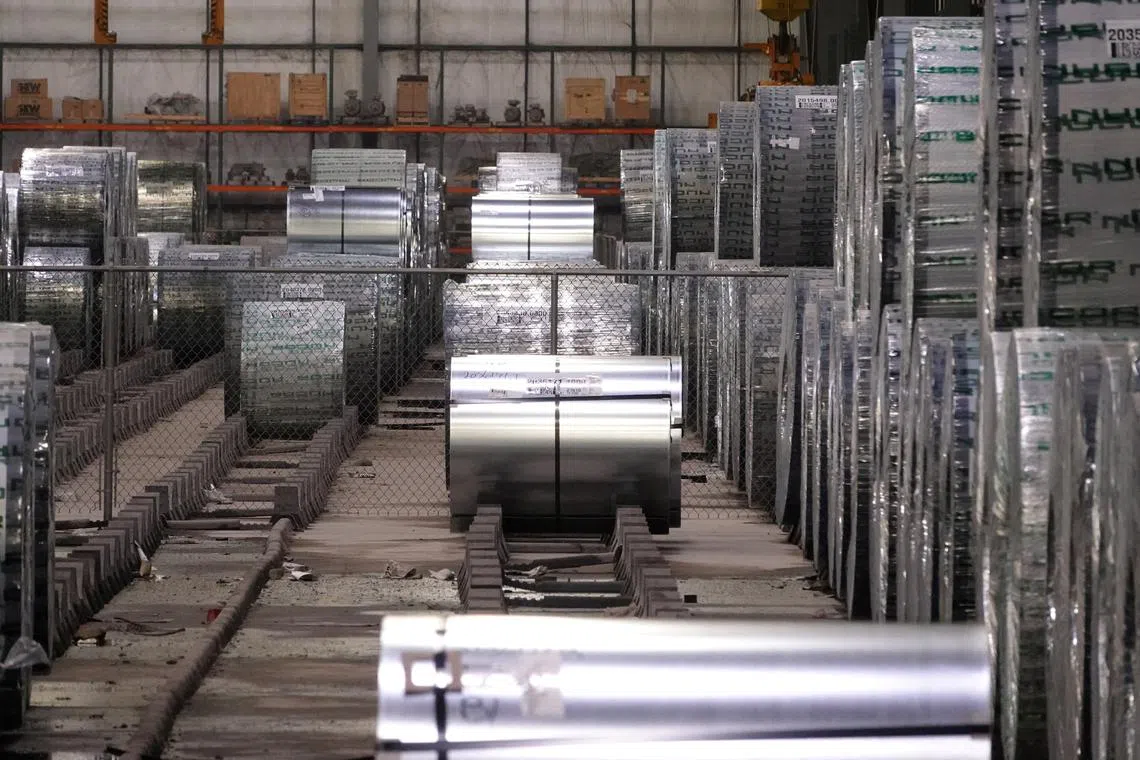‘Worse than Great Recession’: US manufacturing contracts for 6th straight month as tariffs bite
Sign up now: Get ST's newsletters delivered to your inbox

US manufacturers said that the sweeping import duties were making it difficult to manufacture goods in the US.
PHOTO: REUTERS
WASHINGTON – US manufacturing contracted for a sixth straight month in August as factories dealt with the fallout from the Trump administration’s import tariffs, with some manufacturers describing the current business environment as “much worse than the Great Recession”.
The Institute for Supply Management (ISM) survey on Sept 2 also showed some manufacturers complaining that the sweeping import duties were making it difficult to manufacture goods in the US.
President Donald Trump has defended his protectionist trade policy, which has raised the nation’s average tariff rate to the highest in a century, as necessary to revive a long-declining US industrial base.
That was reinforced by government data showing spending on the construction of factories dropped in July and was down 6.7 per cent from a year ago.
Mr Trump said on Sept 2 that his administration would ask the Supreme Court for an expedited ruling on his tariffs after a US appeals court ruled on Aug 29 that most of them were illegal, adding more uncertainty for businesses.
Mr Stephen Stanley, chief US economist at Santander US Capital Markets, said: “I continue to see the broad economy generally and the manufacturing sector in particular as in a holding pattern until tariff-related uncertainty recedes.”
The ISM said its manufacturing purchasing managers’ index (PMI) edged up to 48.7 in August from 48.0 in July. A PMI reading below 50 indicates contraction in manufacturing, which accounts for 10.2 per cent of the economy.
Economists polled by Reuters had forecast the PMI would rise to 49.0.
Seven industries, including textile mills, miscellaneous manufacturing and primary metals, reported growth in August.
Among the 10 industries reporting contraction were makers of paper products, machinery, electrical equipment, appliances and components, and computer and electronic products.
Tariffs continued to dominate commentary from manufacturers.
Some makers of transportation equipment said conditions were worse than the 2007 to 2009 recession, adding “there is absolutely no activity” and “this is 100 per cent attributable to current tariff policy and the uncertainty it has created”. Some viewed the conditions as consistent with “stagflation”.
Some electrical equipment, appliances and components producers complained that “‘made in the US’ has become even more difficult due to tariffs on many components”.
They said the “administration wants manufacturing jobs in the US, but we are losing higher-skilled and higher-paying roles”.
Others reported that because of the lack of “stability in trade and economics, capital expenditure spending and hiring are frozen”.
Manufacturers of computer and electronic products said “tariffs continue to wreak havoc on planning and scheduling activities”, adding that “plans to bring production back into (the) US are impacted by higher material costs, making it more difficult to justify the return”.
Food, beverage and tobacco products manufacturers warned that everything made of organic sugar was “about to get significantly more expensive” because of a 50 per cent tariff on imports from Brazil and the US Department of Agriculture’s elimination of the speciality sugar quota.
Tariffs have been slow to pass through to higher inflation, with economists arguing that businesses are still selling merchandise accumulated before the import duties kicked in.
Businesses also have been absorbing some of the tariff-related costs. But inventories were drawn down in the second quarter, and companies have warned that tariffs are raising their costs, which economists expect will eventually be passed on to consumers.
It is, however, not all doom and gloom for manufacturing.
Businesses have been boosting spending on artificial intelligence (AI) products, which is helping to offset some of the drag from import duties. Spending on intellectual property products grew at its fastest pace in four years in the second quarter, while investment in equipment was strong.
Economists expect the AI spending spree to continue, with factories also likely to get a boost from accelerated depreciation allowances on investments in Mr Trump’s tax and spending Bill.
Mr Ben Ayers, senior economist at Nationwide, said: “Tax incentives that start in 2026 may help to boost investment later in 2025 and into 2026, but for now, most producers remain in wait-and-see mode.” REUTERS


